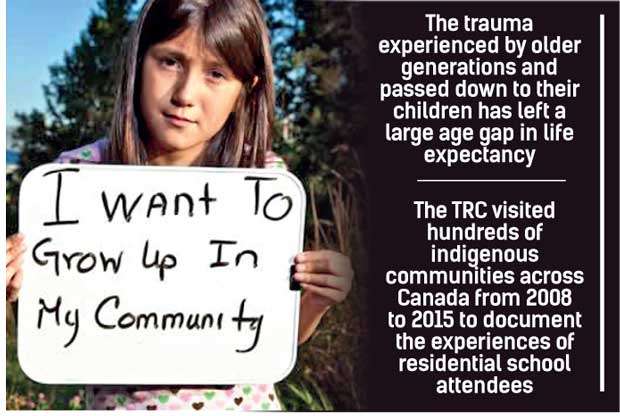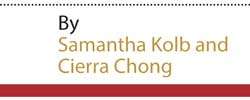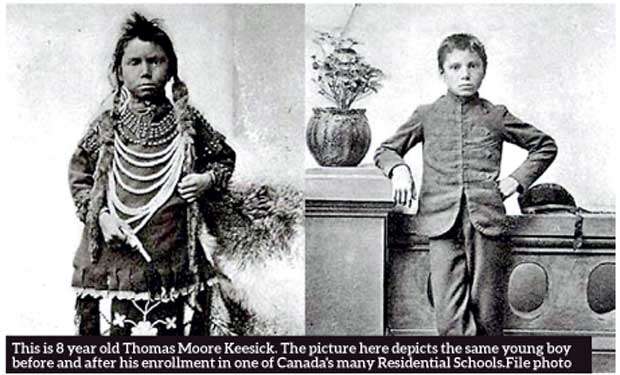Reply To:
Name - Reply Comment
Last Updated : 2024-04-25 00:00:00

 A source of great shame for Canadians, residential schools were meant to make indigenous children “more British”. From 1883 until 1996, the children were taken from their homes and placed in church-run schools far from their communities. The goal of the government-led residential school policy was to destroy the indigenous culture and language. During this time, it is estimated that 150,000 children were placed in residential schools and 6,000 of those children were killed. At the schools, indigenous children faced physical, sexual, emotional, and psychological abuse from the staff.
A source of great shame for Canadians, residential schools were meant to make indigenous children “more British”. From 1883 until 1996, the children were taken from their homes and placed in church-run schools far from their communities. The goal of the government-led residential school policy was to destroy the indigenous culture and language. During this time, it is estimated that 150,000 children were placed in residential schools and 6,000 of those children were killed. At the schools, indigenous children faced physical, sexual, emotional, and psychological abuse from the staff.
The Indian Residential Schools Settlement Agreement (IRSSA) between residential school survivors, Ottawa, and the Crown was announced in 2006. IRSSA recognises the need for reconciliation and is made up of five components: the Common Experience Payment (CEP); Independent Assessment Process (IAP); the Truth and Reconciliation Commission (TRC); Commemoration; and Health and Healing Services. IRSSA allocated $1.9 billion USD for CEP to be distributed out to former residents of the schools. Additional funds have been set aside for the IAP, which deals with sexual, physical and psychological abuse claims, as well as for collective reparations, such as commemorative projects and health services.
Supporting the need for a reparations process, the TRC visited hundreds of indigenous communities across Canada from 2008 to 2015 to document the experiences of residential school attendees. They declared that the residential school policy was in fact “cultural genocide” and the schools had been filled with unimaginable horrors.
It was discovered that the government had been able to fill the schools by threatening the parents with jail time. This left the families with very little choice in the matter. Either the children are left alone while their parents go to jail or they go to the residential schools. In some testimonies, such as Isaac Daniels statement to the TRC, children decided so their parents would not have to.
“I heard my dad talking to my mom there, and he was kind of crying, but he was talking in Cree now. He said that, “It’s either residential school for my boys, or I go to jail.” He said that in Cree. So, I overheard him. So I said the next morning, we all got up, and I said, “Well, I’m going to residential school,” ’cause I didn’t want my dad to go to jail.”
· TRC, AVS, Isaac Daniels, statement to the Truth and Reconciliation Commission of Canada, Saskatoon, Saskatchewan, 22 June 2012, Statement Number: 2011-1779.
The abuse suffered in the residential schools highlighted the need for reparations. Throughout the Truth Commission, survivors spoke of the terror they faced in the schools from staff and their peers.
“Every day was, you were in constant fear that, your hope was that it wasn’t you today that were going to, that was going to be the target, the victim…”
· TRC, AVS, Timothy Henderson, Statement to the Truth and Reconciliation Commission of Canada, Winnipeg, Manitoba, 28 June 2011, Statement Number: 2011-0291.

Today, the after-effects of the residential schools are apparent. The trauma experienced by older generations and passed down to their children has left a large age gap in life expectancy between indigenous and non-indigenous people, high poverty rates, high suicide rates, and a high percentage of indigenous children in foster care.
Through their work, the TRC made a list of recommendations for the Canadian government called the 94 Calls to Action. The 94 Calls to Action relate to child welfare, education, language and culture, health, and justice. As of March, 2018, the Canadian government and communities have proposed projects for 31 of the Calls to Action, are implementing 18 of them, and have yet to start 35 of the recommendations. So far, Canada has completed 10 of the 94 Calls to Action, such as Calls for more inclusive media and education about the past and why apologies are necessary.
The IRSSA-started reparations process for residential school survivors is widely seen as an ongoing success story, however, Canada has only just begun righting the wrongs of its past against indigenous communities
The IRSSA-started reparations process for residential school survivors is widely seen as an ongoing success story, however, Canada has only just begun righting the wrongs of its past against indigenous communities. Canadians and the international community are calling for more reparations for groups harmed by discriminatory policies throughout Canada’s history. Most recently, for the indigenous children who survived the “Sixties Scoop” adoption programme, which forced thousands of children into child welfare services and global adoption from the 1960s to the 1980s. On 6 October, 2017, the Canadian government agreed to pay out $640 million CAD in legal settlements for those affected by the adoption programme.
Canada is still facing its own challenges in the impartiality of the TRC, providing reparations that are acceptable to all victims, and implementing all of the Calls to Action. Despite this, the reparations process emphasises the needs of victims when deciding what remedies are appropriate. In Sri Lanka, there will be similar challenges in providing reparations appropriate to all victims who were harmed, purposefully or not. However, there is an opportunity for inclusiveness, victim-centrality and healing by addressing all experiences of civil unrest and conflict.

Add comment
Comments will be edited (grammar, spelling and slang) and authorized at the discretion of Daily Mirror online. The website also has the right not to publish selected comments.
Reply To:
Name - Reply Comment
US authorities are currently reviewing the manifest of every cargo aboard MV
On March 26, a couple arriving from Thailand was arrested with 88 live animal
According to villagers from Naula-Moragolla out of 105 families 80 can afford
Is the situation in Sri Lanka so grim that locals harbour hope that they coul